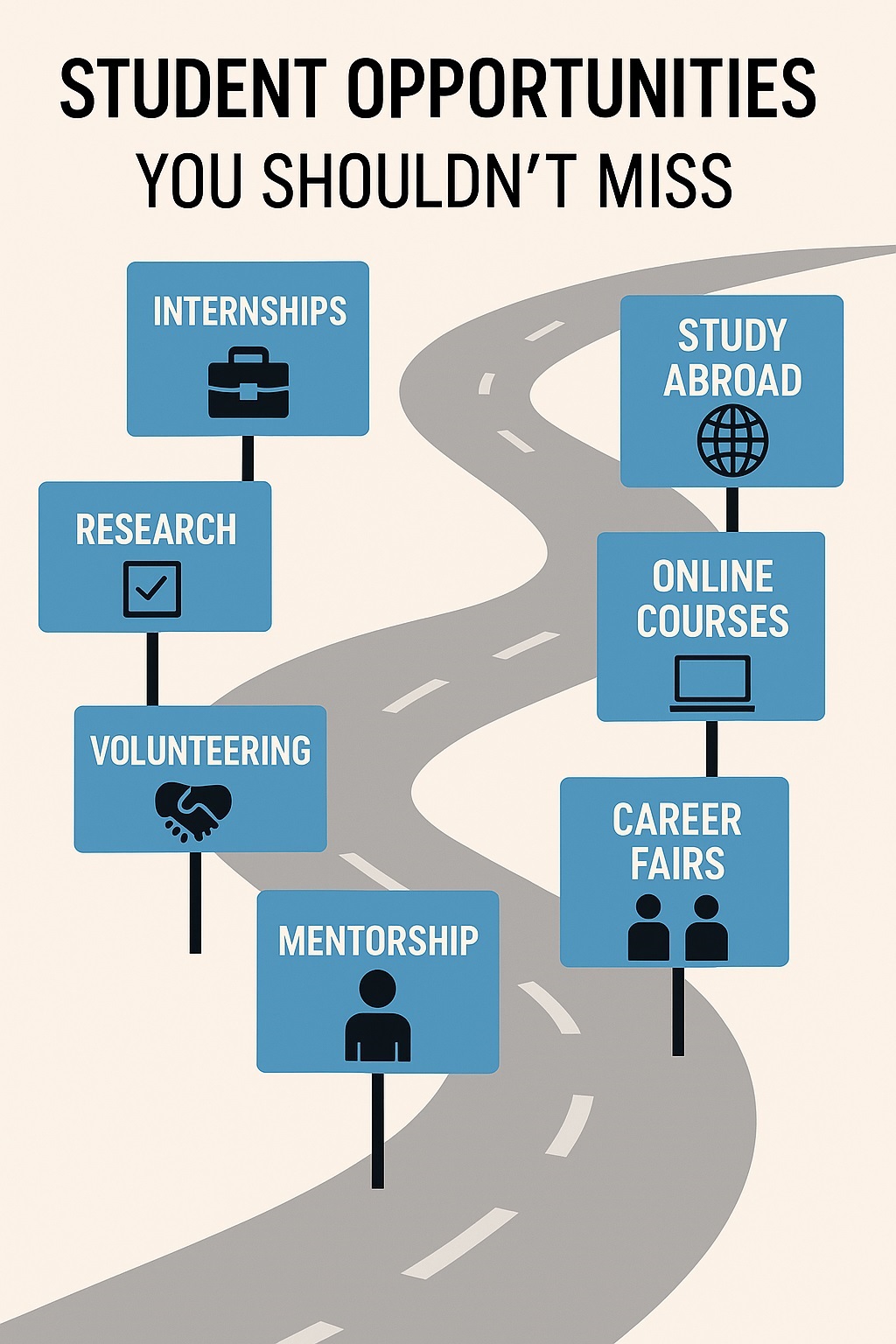
It’s easy to feel overwhelmed in college. You’re juggling lectures, assignments, part-time jobs—and somewhere in between, you’re expected to “figure out your future.” But let’s be honest: getting a degree is only one piece of the puzzle. Students today face a deeper problem—uncertainty. How do you stand out when everyone has similar qualifications? How do you get experience without already having it?
Here’s the truth: some of the most valuable learning happens outside the classroom. And yet, many students overlook real-life opportunities that could completely change their path. Whether gaining hands-on experience, building global awareness, or getting involved, certain chances don’t come around twice. This article breaks down seven opportunities that students worldwide have used to create better futures—opportunities backed by research, lived stories, and practical solutions. If you're ready to make college count, start here.
Table of Content
- Internship and Co-Op Programs
- Study Abroad and Exchange Programs
- Undergraduate Research and Capstone Projects
- Volunteering and Service-Based Learning
- Online Learning and Certifications
- Leadership Roles in Clubs and Campus Organizations
- Networking and Mentorship
- Conclusion
- FAQs

Internship and Co-Op Programs
Why Work Experience Changes the Game
Have you ever seen job listings that require experience, even for entry-level roles? That’s the catch many students run into. Internships help you sidestep that trap. They’re your chance to gain hands-on knowledge, make mistakes, and determine what work suits you. The best part? You get to test a career before committing to it long-term.
A NACE study found that students with paid internships received 32% more job offers than those without any internship experience. That’s not a small margin—the edge makes a difference.
Where to Begin
-
Visit your college’s career center—they often have exclusive listings.
-
Build a simple LinkedIn profile and connect with alumni.
-
Look for opportunities through platforms like ErasmusIntern.org, Google Summer of Code, or UN Careers.
Unpaid internships can still offer value, but if possible, aim for ones that give you both learning and a small stipend. Either way, they help build your résumé—and your confidence.
Study Abroad and Exchange Programs
Changing the Way You See the World
Studying in another country isn’t just about travel—it’s about growth. When you leave your comfort zone, you start to think differently. You learn to adapt, communicate across cultures, and appreciate perspectives you never considered.
Data from the Institute of International Education shows that over 70% of students who studied abroad felt more confident and capable afterwards. Plus, employers love it—global experience often signals flexibility and open-mindedness.
Making It Happen
-
Explore programs like Erasmus+, which fund exchanges within Europe.
-
Check with your school’s international office about partner institutions.
-
Look into grants or scholarships—many programs cover partial or full costs.
Short-term options like summer exchanges or virtual global classrooms are great starting points if long-term study abroad feels out of reach.
Undergraduate Research and Capstone Projects
Turning Curiosity into Skill
Ever wondered what it’s like to investigate something deeply, instead of memorizing answers? Research gives you that space. It helps you work closely with faculty, tackle real-world problems, and build the critical thinking skills that employers (and grad schools) value.
Surveys from the Association of American Colleges & Universities show that 79% of employers want to see a project in which students apply what they’ve learned. Research ticks that box.
Finding Your Place
-
Ask a professor if you can assist with their project.
-
Join a research club or apply for summer fellowships.
-
Don’t wait—start with small roles and grow from there.
Even if you don’t plan to become a scientist or academic, research teaches you how to frame questions, analyze results, and present findings clearly—skills that transfer to every field.
Volunteering and Service-Based Learning
Doing Good While Learning More
Volunteering doesn’t just help others—it helps you, too. It teaches empathy, initiative, and the ability to work with diverse groups. Whether helping at a community garden or tutoring school kids, you build character and competence.
Deloitte research reveals that 82% of hiring managers are more likely to choose candidates with volunteer experience. This shows commitment and people skills.
Getting Involved
-
Check out VolunteerMatch or Idealist for local and virtual roles.
-
Join student-led service clubs on campus.
-
Explore international programs like UN Volunteers or AIESEC.
Don’t underestimate the impact of giving your time. It might shape your career more than any textbook ever could.
Online Learning and Certifications
Learning That Fits Your Life
Let’s say your degree doesn’t cover what employers seek—maybe data analytics, digital marketing, or user experience design. You don’t have to wait for someone to teach you. Online learning lets you take charge.
According to a Coursera study, 89% of learners say certificates helped them stand out. Employers agree—92% view online certifications as proof of relevant skills.
Choosing Smartly
-
Use platforms like Coursera, edX, or LinkedIn Learning.
-
Look for courses from well-known institutions or employers (Google, Meta, IBM).
-
Pick skills tied to real career goals, and share your certificates.
Online learning shows that you're proactive and willing to adapt—qualities employers value as much as technical ability.
Leadership Roles in Clubs and Campus Organizations
Why Leadership Starts Now
Want to learn how to manage a team, run a budget, or coordinate an event? Student organizations are where those lessons begin. Clubs let you practice leadership in a real (but forgiving) environment.
A NACE employer survey found that leadership experience was among the top three qualities new hires seek. That means your treasurer or event chair role could make a bigger difference than you think.
Making It Work for You
-
Join a club that genuinely interests you.
-
Volunteer for small roles, then aim for leadership.
-
Keep track of your work, event numbers, feedback, or budget management.
You’ll come away with more than memories. You’ll build confidence, problem-solving skills, and stories you can share in interviews.
Networking and Mentorship
The Power of Who You Know
You’ve probably heard it before: networking matters. That’s because it does. Many job openings aren’t posted publicly—they’re filled through referrals. Mentors, meanwhile, can guide you through confusing decisions and help you avoid mistakes.
Studies suggest that 70–85% of jobs are found through networking. And mentorship? Research from Cambridge University found that mentored students had stronger career clarity and academic confidence.
Getting Connected
-
Start with professors, advisors, and guest speakers.
-
Attend alumni mixers or career panels.
-
Use LinkedIn to reach out—start by asking thoughtful questions.
Mentorship isn’t about asking for favors. It’s about building trust over time. Ask, listen, follow up—and always say thank you.
Conclusion
College gives you more than credits—it gives you choices. These seven opportunities aren’t extra—they’re foundational. They help you move from student to professional, from classroom to real life.
You don’t have to do them all at once. Pick one. Start small. Track your progress. Each step gives you new skills, a stronger voice, and a clearer direction. The sooner you begin, the further you'll go.
So, ask yourself: what’s one thing you can do this semester that your future self will thank you for? Find it. Commit to it. Then do it.
FAQs
1. Can I afford to study abroad as a regular student?
Yes. Many programs offer scholarships, grants, or tuition exchanges. Erasmus+, Fulbright, and your home university may all offer support.
2. I don’t have connections—how do I start networking?
Begin where you are. Talk to professors, attend events, and message alumni. You don’t need to “know someone”—you just need to be curious and respectful.
3. How can I manage time between studies and extracurriculars?
Plan weekly. Use calendars. Focus on depth, not breadth—better to lead one club than show up to five. Rest is part of the plan, too.
4. Are online courses taken seriously by employers?
Yes, if they’re relevant and credible. A certification in Python from IBM means something. So does a portfolio of real projects.
5. What if I fail at my first internship or project?
You won’t be the first. Or the last. Learn from it, reflect, and move on. Growth comes through mistakes—it’s part of the story you’re building.
Students

